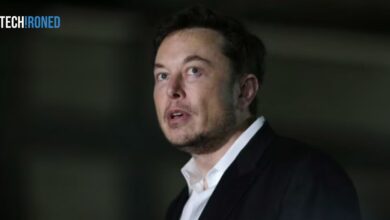
Elon Musk Could Earn More at Tesla Than Other Bosses
Elon Musk could earn more at Tesla than other company bosses—that’s the headline-grabbing reality we’re diving into today. It’s a fascinating look at executive compensation in the tech world, specifically how Tesla’s unique structure and Musk’s pivotal role impact his potential earnings. We’ll compare his compensation package to other tech giants, analyze the performance metrics driving his pay, and explore the wild ride of stock options and their influence on his overall wealth.
Get ready for a deep dive into the world of multi-billion dollar paychecks!
This isn’t just about numbers; it’s about the strategic decisions, innovations, and market forces that shape the compensation of a CEO as influential as Elon Musk. We’ll dissect Tesla’s compensation structure, examine Musk’s leadership, and compare his earnings to those of other tech CEOs. We’ll also look at how Tesla’s stock price directly impacts his potential earnings, and the risks and rewards of such a compensation plan.
It’s a story of ambition, risk, and the incredible power of market forces.
Tesla’s Compensation Structure for Elon Musk

Elon Musk’s compensation at Tesla is a unique and often debated topic. Unlike traditional CEO compensation packages focused primarily on salary and bonuses, Musk’s arrangement is heavily tied to the company’s performance and stock price, creating a high-risk, high-reward scenario. This approach, while unconventional, reflects Musk’s ambitious vision for Tesla and his commitment to long-term growth. It’s crucial to understand the specifics of this structure to accurately assess its impact on both Musk and Tesla.
Comparison of Elon Musk’s Compensation to Other CEOs
The following table compares Elon Musk’s compensation to that of CEOs at comparable companies. It’s important to note that direct comparisons are difficult due to the highly unusual nature of Musk’s compensation. The data used here represents reported figures and may vary depending on the source and accounting practices. The “Compensation Structure Details” column provides a brief overview and is not exhaustive.
| Company Name | CEO Name | Total Compensation (USD) | Compensation Structure Details |
|---|---|---|---|
| Tesla | Elon Musk | Highly variable, dependent on stock performance; potentially billions | Primarily stock options and performance-based awards, minimal base salary. |
| Apple | Tim Cook | ~100 million (approximate, varies yearly) | Significant salary, stock awards, and bonuses. |
| Microsoft | Satya Nadella | ~50 million (approximate, varies yearly) | High salary, substantial stock awards, and performance-based bonuses. |
| Amazon | Andy Jassy | ~300 million (approximate, varies yearly) | Significant salary, stock awards, and performance-based bonuses. |
Performance Metrics Tied to Musk’s Compensation
Musk’s compensation is primarily linked to achieving ambitious milestones related to Tesla’s market capitalization and operational performance. These metrics are structured across multiple tranches, requiring Tesla to reach specific market capitalization targets and operational goals (such as production and revenue targets). Reaching these milestones unlocks the right to acquire large amounts of Tesla stock options at pre-determined prices.
Elon Musk’s Tesla compensation package is mind-boggling; he could potentially rake in more than almost any other CEO. It makes you wonder about the power dynamics at play, something the podcast why the rest is politics a british podcast is a hit explores brilliantly. The podcast’s success highlights how much people crave insight into such power structures, mirroring the intense public interest in Musk’s financial dealings and Tesla’s success.
Failure to meet the milestones results in no compensation payout for those tranches. This structure incentivizes Musk to prioritize long-term growth and aggressive expansion of Tesla’s operations. The specific targets and details of these milestones are documented in Tesla’s SEC filings.
Impact of Tesla’s Stock Price on Musk’s Earnings
The impact of Tesla’s stock price on Musk’s earnings is monumental. Because his compensation is overwhelmingly tied to stock options, fluctuations in Tesla’s share price directly affect the value of these options. A significant rise in Tesla’s stock price dramatically increases the value of his options, potentially leading to billions of dollars in compensation. Conversely, a substantial drop in the stock price could significantly diminish or even eliminate the value of his options.
This high degree of risk and reward is a defining feature of Musk’s compensation package, making it a unique case study in executive compensation strategies. For example, a substantial increase in Tesla’s stock price in 2020 and 2021 led to a significant increase in Musk’s net worth. Conversely, any significant downturn in Tesla’s share price could negatively impact his overall compensation.
Musk’s Role and Contributions to Tesla’s Success
Elon Musk’s role at Tesla extends far beyond that of a typical CEO. He’s been the driving force behind the company’s vision, its technological innovations, and its aggressive market strategy, all contributing significantly to its current success. His leadership style, though often described as unconventional, has undeniably shaped Tesla’s trajectory and propelled it to the forefront of the electric vehicle revolution.Musk’s leadership is characterized by a relentless pursuit of ambitious goals, a willingness to take significant risks, and a hands-on approach to product development and marketing.
This direct involvement, while sometimes criticized for its intensity, has fostered a culture of innovation and rapid iteration within Tesla. His ability to inspire and motivate his teams, even amidst significant challenges, has been crucial in overcoming obstacles and achieving seemingly impossible milestones.
Tesla’s Strategic Direction Under Musk’s Leadership
Several key strategic decisions by Musk have been instrumental in Tesla’s financial performance. The decision to focus on building a vertically integrated company, controlling everything from battery production to the sales and service network, allowed Tesla to maintain quality control and optimize its supply chain. This contrasts sharply with traditional automotive manufacturers who rely heavily on external suppliers.
Furthermore, Musk’s commitment to direct-to-consumer sales, bypassing traditional dealerships, allowed Tesla to build a stronger brand identity and directly engage with its customer base. This strategy also provided valuable customer feedback, directly influencing product development and enhancing customer loyalty. The strategic investment in Gigafactories globally, significantly increasing production capacity and reducing manufacturing costs, was another crucial decision that fueled Tesla’s growth.
Technological Advancements Driven by Musk
Musk’s relentless pursuit of technological innovation has been a cornerstone of Tesla’s success. His leadership in developing advanced battery technology, particularly the development and implementation of lithium-ion battery packs with significantly improved energy density and charging capabilities, has been pivotal. This has resulted in longer driving ranges and faster charging times for Tesla vehicles, making them more competitive and appealing to a wider range of consumers.
Elon Musk’s potential Tesla earnings dwarf those of many CEOs, a stark contrast to the broader economic picture. I was thinking about this while reading an interesting article on whether we’re seeing the peak of tipping culture in the US – check it out: is america approaching peak tip. It makes you wonder if such extreme wealth concentration is sustainable, especially when considering broader economic trends like the potential decline in discretionary spending that impacts tipping culture.
Musk’s massive potential Tesla payout highlights the widening gap between the ultra-rich and the rest of us.
Furthermore, Tesla’s Autopilot and Full Self-Driving capabilities, although still under development, represent significant advancements in autonomous driving technology and have positioned Tesla as a leader in this rapidly evolving field. These technological leaps have not only improved the functionality and desirability of Tesla vehicles but have also significantly boosted the company’s market valuation, making it a leader in the electric vehicle and technology sectors.
Elon Musk’s Tesla compensation package is seriously eye-watering; he could potentially rake in more than almost any other CEO. It makes you wonder about the sheer scale of things, like how a seemingly smaller event, such as whether could the Kamala Harris boost put Florida in play for Democrats , could impact the overall economic climate that influences such massive salaries.
Ultimately, Musk’s earnings are a fascinating reflection of the current economic landscape.
Comparison with Other Tech Company CEOs
Elon Musk’s compensation package at Tesla has been a subject of intense scrutiny and debate. While his massive potential earnings are unprecedented in the tech industry, comparing his compensation to that of other major tech CEOs provides valuable context and allows for a deeper understanding of different corporate compensation philosophies. This analysis focuses on total compensation, encompassing salary, bonuses, stock awards, and other benefits, to offer a comprehensive comparison.
It’s crucial to remember that direct comparisons can be tricky due to the varying structures of compensation packages and the different stages of growth and market capitalization of each company. Stock options, for instance, represent a significant portion of many CEO compensation packages and their value fluctuates wildly depending on market performance. Therefore, focusing solely on the total compensation figure provides a simplified, yet useful, comparative metric.
CEO Compensation Comparison Across Major Tech Companies, Elon musk could earn more at tesla than other company bosses
The following list provides a snapshot of the total compensation for CEOs at several leading tech companies in a recent fiscal year. Note that these figures are estimates based on publicly available data and may vary slightly depending on the source and accounting methods. The figures represent the total value of compensation, including salary, bonuses, stock awards, and other benefits, and reflect a specific period.
Precise figures fluctuate from year to year.
- Tim Cook (Apple): While precise figures vary depending on the year and source, his total compensation typically falls within a range significantly lower than Elon Musk’s potential maximum compensation at Tesla. A large portion of his compensation is tied to Apple’s stock performance, reflecting a common practice in the tech industry.
- Sundar Pichai (Google/Alphabet): Similar to Tim Cook, Sundar Pichai’s compensation, while substantial, is considerably less than Elon Musk’s potential earnings at Tesla. His compensation structure also heavily relies on stock-based incentives, aligning his interests with the company’s long-term success.
- Satya Nadella (Microsoft): Satya Nadella’s compensation package, though significant, follows a more traditional structure compared to Elon Musk’s, with a larger emphasis on salary and bonuses alongside stock options. This structure is reflective of a more established company with a more mature market position.
Compensation Philosophies in the Tech Industry
The variations in CEO compensation across the tech industry reflect differing corporate governance structures, company performance, and risk tolerance. Some companies, particularly those in more established markets, may favor a more traditional compensation structure emphasizing base salary and bonuses, while others, especially high-growth companies, might prioritize stock-based compensation to incentivize long-term value creation and align CEO interests with shareholder returns.
Tesla’s compensation structure for Elon Musk, for instance, is highly unusual in its focus on achieving ambitious, long-term performance goals, which carries significant risk and reward.
Factors Contributing to Variations in CEO Compensation
Several key factors contribute to the wide range of CEO compensation across the tech industry. Company size and market capitalization are significant drivers, with larger, more successful companies typically offering higher compensation packages. The company’s performance, both in terms of revenue growth and stock price appreciation, also plays a crucial role, as does the CEO’s perceived contribution to the company’s success.
The industry’s competitive landscape, the scarcity of top-tier talent, and the overall risk associated with the CEO’s role also influence compensation levels. Finally, differing corporate governance practices and shareholder expectations play a significant role in shaping compensation strategies.
Market Valuation and Executive Compensation: Elon Musk Could Earn More At Tesla Than Other Company Bosses

The astronomical success of Tesla, and by extension Elon Musk’s immense wealth, is inextricably linked to the company’s market capitalization. Musk’s compensation package, while unconventional, is heavily reliant on Tesla’s stock performance, creating a powerful incentive for him to drive growth and shareholder value. This symbiotic relationship, however, also raises questions about the fairness and effectiveness of such compensation structures in the broader context of executive pay.Tesla’s market capitalization directly influences Elon Musk’s earnings, primarily through his stock options.
A significant portion of his compensation is tied to achieving pre-defined milestones, many of which are related to Tesla’s overall market valuation and stock price targets. This means that substantial increases in Tesla’s stock price directly translate into massive gains for Musk, while conversely, a downturn in the stock market could significantly diminish his potential earnings. The inherent risk and reward are considerable, mirroring the volatile nature of the technology sector.
Tesla Stock Price Fluctuations and Musk’s Earnings
Let’s consider a hypothetical scenario. Suppose Tesla’s stock price rises from $200 to $1000 per share over a set period. If a significant portion of Musk’s compensation is tied to achieving this price target, his earnings would increase proportionally. Conversely, if the stock price were to fall to $50 per share, his potential earnings from those options would drastically decrease or even become worthless.
This illustrates the direct correlation between Tesla’s market performance and Musk’s personal financial success. Real-world examples of this dynamic are readily apparent; major announcements, positive product reviews, or successful new product launches have historically sent Tesla’s stock price soaring, directly impacting Musk’s wealth. Similarly, production setbacks, negative publicity, or regulatory challenges have resulted in stock price declines, affecting his potential earnings.
Investor Confidence and Market Perception
Investor confidence and market perception play a pivotal role in shaping executive compensation within the automotive industry, and Tesla is no exception. Positive investor sentiment, driven by factors such as innovative product releases, strong financial performance, and a positive outlook for the future, tends to inflate a company’s stock price. This directly benefits CEOs like Musk whose compensation is tied to stock performance.
Conversely, negative investor sentiment, perhaps triggered by production delays, safety concerns, or negative news coverage, can lead to a decline in stock price, impacting executive compensation negatively. The automotive industry, increasingly influenced by technological advancements and consumer preferences, is highly susceptible to shifts in market perception, making executive compensation structures that rely on stock performance particularly vulnerable to these fluctuations.
The case of Tesla exemplifies how rapidly shifting investor sentiment can have dramatic effects on both a company’s valuation and its CEO’s compensation.
Long-Term Incentives and Stock Options

Elon Musk’s compensation at Tesla isn’t about a hefty annual salary; it’s largely tied to the company’s long-term success, primarily through a massive package of stock options. This strategy is a high-stakes gamble, both for Musk and Tesla, but it’s also a powerful incentive driving extraordinary growth. The structure fundamentally links his personal wealth to the company’s market capitalization, creating a powerful alignment of interests.The significance of these long-term stock options lies in their ability to motivate Musk to prioritize Tesla’s long-term value creation over short-term profits.
Traditional salary-based compensation can sometimes incentivize executives to focus on immediate gains, potentially at the expense of future growth. Musk’s option grants, however, are contingent upon Tesla achieving ambitious milestones in market capitalization and operational performance over extended periods. This structure ensures that he is directly rewarded only when Tesla demonstrates sustained and significant success. This approach is a departure from traditional executive compensation models and reflects a unique risk-reward dynamic.
Stock Option Payout Visualization
Imagine a graph charting Tesla’s market capitalization on the x-axis and Musk’s potential payout from stock options on the y-axis. The graph would be non-linear, exhibiting an exponential relationship. The line would start at zero, representing the initial value of the options. As Tesla’s market cap increases, the line would rise steeply, but at an accelerating rate. For example, if the market cap doubles, the payout wouldn’t simply double; it would increase exponentially due to the nature of stock options and their leverage.
Several lines could be plotted, each representing a different set of achievable milestones or scenarios (e.g., a conservative scenario, a most likely scenario, and an optimistic scenario). The conservative scenario might show a modest increase in payout even with substantial growth in market capitalization, while the optimistic scenario would portray a massive increase in payout reflecting significant growth exceeding expectations.
The different lines would clearly illustrate the potential range of outcomes depending on Tesla’s performance. The graph would visually demonstrate the high-risk, high-reward nature of Musk’s compensation.
Risks and Rewards for Musk and Tesla
The long-term stock option structure presents both substantial risks and rewards for both Musk and Tesla. For Musk, the reward is potentially enormous wealth if Tesla achieves its ambitious targets. However, if Tesla fails to meet these targets, his payout could be minimal or even zero, despite his significant contributions. The risk lies in the volatility of the stock market and the inherent uncertainty of future performance.
For Tesla, the reward is a highly motivated CEO deeply invested in the company’s success. The risk is the potential for significant dilution of shareholder value if the stock price increases dramatically, leading to a large payout for Musk. This is a classic agency problem, but the structure attempts to mitigate it by aligning incentives. A real-life example illustrating this risk-reward dynamic is the massive increase in Musk’s net worth following Tesla’s surge in market capitalization.
Conversely, a significant downturn in Tesla’s performance would severely impact the value of his options, illustrating the downside risk. The inherent volatility of the tech sector and the overall market significantly influences the risk-reward equation.
So, could Elon Musk truly earn more at Tesla than his counterparts at other major tech companies? The answer, as we’ve explored, is a resounding “it depends.” It hinges on Tesla’s continued success, the performance of its stock, and the continued execution of Musk’s ambitious vision. While his compensation package is undeniably unique and potentially lucrative, it also carries significant risk.
Ultimately, Musk’s earnings are a captivating case study in the intricate relationship between executive compensation, company performance, and market dynamics in the ever-evolving world of technology.




